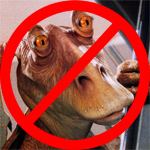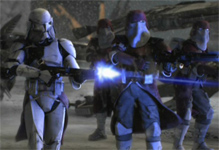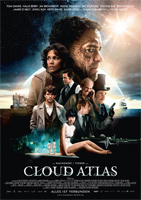Unless you’ve been hiding out in the desert canyons of Tatooine, you’ve heard the news that Disney bought out Lucasfilm for $4 billion and change. In addition to running Vader all over Disneyworld, they’re promising a new Star Wars film (Episode VII) in 2015. Every fanboy in the world is taking his turn as backseat driver, and I’m no exception. So, grant me a few moments to be R2 and tell Luke what I would do if I had bought Star Wars.
 The very first thing I would do is to rerelease the original trilogy on Blu-Ray in its completely unaltered form. I would take the best scan of the films (probably already existing at 4K as source material for the special editions), make sure they were clean, and put them out on Blu-Ray. No special edition. No Greedo shooting first. No Hayden Christensen on Endor.
The very first thing I would do is to rerelease the original trilogy on Blu-Ray in its completely unaltered form. I would take the best scan of the films (probably already existing at 4K as source material for the special editions), make sure they were clean, and put them out on Blu-Ray. No special edition. No Greedo shooting first. No Hayden Christensen on Endor.
Every fanboy of my generation has been lusting for precisely this since before Blu-Ray even existed, and is ready to shell out hard cash for this. Doing this simple act would generate $2-$3 billion right off the bat. My math? 50 million fan boys (world-wide) at $50 for the trilogy comes out to $2.5 billion. Play around with the pricing, add more fan boys, start talking net instead of retail… the numbers move around. But clearly, this one simple act that Lucas has blocked for years would repay a decent chunk of the purchase price.
I would follow that up with a Blu-Ray release that was a mix of original and special edition. This would be for the true aficionados, who insist that Han shot first but liked some of the cleaner special effects that came with the special editions and might like some of the deleted scenes as in-line bonus material. Fine-tuning this would be a fan-by-fan project, but the options available on modern Blu-Rays should allow viewers to pick and choose. This would sell far fewer copies, but you could easily charge more. It won’t finish paying off the Lucasfilm mortgage, but it will shave off a few more points.
Mind you, this is money George could have had himself but chose to thwart the fans. I don’t expect Disney will leave that money on the table.
Then we have to start talking about the other movies. I can see the commercial logic of Disney wanting to start afresh with the later chapters, but if I were running the show, I would start with the prequels. Yes, they’ve already been done, but they were done wrong. I don’t expect much disagreement on that.
I don’t fault the general arc of the story. Specifically, I’m fine with finding Anakin as a kid (though I’d start him post-puberty), seeing him grow to be an undisciplined Jedi, and all the while seeing Palpatine manipulate events to build his power. That stuff is okay. Where it failed was in other areas:
- It was meant for kids, not the adults who had grown up on Star Wars.
- Anakins’ motivations were lame, both surrounding his mother and Padme.
- Anakin was too much of a whiner, hardly the precursor for Darth Vader in the original trilogy.
 How would I have fixed all that? There are the obvious choices of removing Jar-Jar entirely and making Anakin older when we first meet him, but beyond that, I would make Anakin’s character much deeper and thoughtful. Instead of him becoming a victim of his own emotional immaturity, he would make rational choices based on enlightened self-interest. He would act for himself, for the Jedi, and ultimately for the good of the galaxy.
How would I have fixed all that? There are the obvious choices of removing Jar-Jar entirely and making Anakin older when we first meet him, but beyond that, I would make Anakin’s character much deeper and thoughtful. Instead of him becoming a victim of his own emotional immaturity, he would make rational choices based on enlightened self-interest. He would act for himself, for the Jedi, and ultimately for the good of the galaxy.
And that is the biggest disappointment I had with the prequels and how I would have done them differently. I want to see Anakin make a rational choice to turn to the dark side. I want to see him split from the rest of the Jedi over a matter where it was possible to take two sides. I want to see him take Palpatine’s side on this issue because he believes in it. And finally, I want to see him take up the dark side because he needs its power to carry out his vision for the galaxy. He might still be Palpatine’s chess piece, but he would be elevated from pawn to knight.
That is the kind of back story that lets Vader be the man he was in the original trilogy: dedicated, ruthless, and willing to turn on his master when the time came.
And then I would turn to the follow-up movies, and just like my reboot of the prequels, I would make these for adults, not for the kids. It doesn’t have to be rated R, but it needs a serious, adult theme. And for that, I would choose the deliberate genocide of the Jedi and Sith.
What? That’s right. The Jedi and Sith must be exterminated.
 At least, that will be the position of the newly restored Republic. It was their faith in the Jedi that allowed their downfall. It was the rise of powerful Sith lords that crushed them. Without them, the Republic would have continued. Its politics might have been corrupt, but at least they had a political voice rather than the force choke of Palpatine and Vader. Wouldn’t they be better off with these mutants out of the picture?
At least, that will be the position of the newly restored Republic. It was their faith in the Jedi that allowed their downfall. It was the rise of powerful Sith lords that crushed them. Without them, the Republic would have continued. Its politics might have been corrupt, but at least they had a political voice rather than the force choke of Palpatine and Vader. Wouldn’t they be better off with these mutants out of the picture?
But doesn’t that make our heroes from the original trilogy (especially Luke and Leia) the bad guys? No, in a search for scapegoats and revenge, the Republic has become insane and evil. The Republic is now the enemy, casting out or heroes and hunting them down along with their children. Even if we throw midichlorians out the window, it is well known from the first films that the Force runs strong in Luke’s family. Throw in the children, siblings, and cousins of the old Jedi order, and you have a genetic pool of would-be Force-users who will be on the run.
Thus, our heroes are thrown back into the role of the underdog. They are stripped of many of their allies. They have to survive, form their own resistance for mutual support, and train a new generation of Jedi in secret. Then, by the time the third film comes along, a new danger will threaten the Republic, and these Jedi, old and new, will have to step up and become the guardians of the Republic once again.
It is a tale of revenge vs. redemption.
Anyway, that’s what I would have done if I had bought Star Wars. What would you have done?


 Red Planet: This one was apparently too boring for most folks, but I found it engaging. While the science jumped back and forth between spot-on and WTF, I enjoyed the gritty problems they engaged, from fire in space, to making an overland trek across the Martian desert. Plus, I really enjoyed Val Kilmer’s character and the sexual tension he had with the pilot Carrie Ann Moss. I’ll admit, the whole robot idea was ill-conceived, but it did add a little excitement. And of course, the line that stuck with me: “This is it. That moment they told us in high school where one day, algebra would save our lives.”
Red Planet: This one was apparently too boring for most folks, but I found it engaging. While the science jumped back and forth between spot-on and WTF, I enjoyed the gritty problems they engaged, from fire in space, to making an overland trek across the Martian desert. Plus, I really enjoyed Val Kilmer’s character and the sexual tension he had with the pilot Carrie Ann Moss. I’ll admit, the whole robot idea was ill-conceived, but it did add a little excitement. And of course, the line that stuck with me: “This is it. That moment they told us in high school where one day, algebra would save our lives.” I’m reviewing the movie here, not the book it was based on. I actually tried reading the book, but I have a hard time reading dialect, and both book and film half quite a bit of it. Hence, I settled for the movie.
I’m reviewing the movie here, not the book it was based on. I actually tried reading the book, but I have a hard time reading dialect, and both book and film half quite a bit of it. Hence, I settled for the movie. The very first thing I would do is to rerelease the original trilogy on Blu-Ray in its completely unaltered form. I would take the best scan of the films (probably already existing at 4K as source material for the special editions), make sure they were clean, and put them out on Blu-Ray. No special edition. No Greedo shooting first. No Hayden Christensen on Endor.
The very first thing I would do is to rerelease the original trilogy on Blu-Ray in its completely unaltered form. I would take the best scan of the films (probably already existing at 4K as source material for the special editions), make sure they were clean, and put them out on Blu-Ray. No special edition. No Greedo shooting first. No Hayden Christensen on Endor. How would I have fixed all that? There are the obvious choices of removing Jar-Jar entirely and making Anakin older when we first meet him, but beyond that, I would make Anakin’s character much deeper and thoughtful. Instead of him becoming a victim of his own emotional immaturity, he would make rational choices based on enlightened self-interest. He would act for himself, for the Jedi, and ultimately for the good of the galaxy.
How would I have fixed all that? There are the obvious choices of removing Jar-Jar entirely and making Anakin older when we first meet him, but beyond that, I would make Anakin’s character much deeper and thoughtful. Instead of him becoming a victim of his own emotional immaturity, he would make rational choices based on enlightened self-interest. He would act for himself, for the Jedi, and ultimately for the good of the galaxy. At least, that will be the position of the newly restored Republic. It was their faith in the Jedi that allowed their downfall. It was the rise of powerful Sith lords that crushed them. Without them, the Republic would have continued. Its politics might have been corrupt, but at least they had a political voice rather than the force choke of Palpatine and Vader. Wouldn’t they be better off with these mutants out of the picture?
At least, that will be the position of the newly restored Republic. It was their faith in the Jedi that allowed their downfall. It was the rise of powerful Sith lords that crushed them. Without them, the Republic would have continued. Its politics might have been corrupt, but at least they had a political voice rather than the force choke of Palpatine and Vader. Wouldn’t they be better off with these mutants out of the picture? Looper is a good old-fashioned time-travel film, complete with loops and the occasional paradox. Plus, it has two great actors (Gordon Levitt and Bruce Willis) letting loose with big guns. So, good story, good acting, and things go boom.
Looper is a good old-fashioned time-travel film, complete with loops and the occasional paradox. Plus, it has two great actors (Gordon Levitt and Bruce Willis) letting loose with big guns. So, good story, good acting, and things go boom.